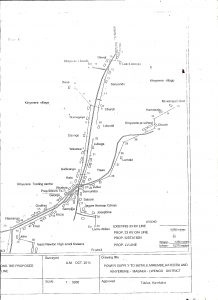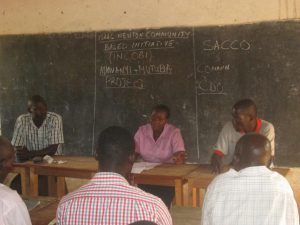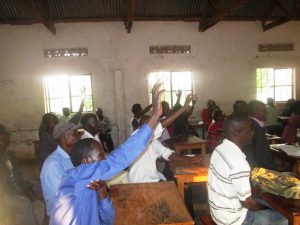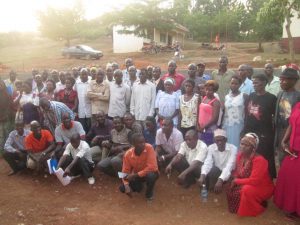 Workmen are setting up camp at Isaac Newton High School in preparation for the installation of new high-tension power cables. This is part of the Ministry of Energy and Mineral Development’s rural electrification programme. The scheme will bring much needed renewable hydro-electric power to the school and to the villages of Kateera, Kinyerere, Mirembe and Kibisi, where most of the school’s children live. The total cost of the project is £53,000. The Uganda government will cover £42,000 of this, using funds from the World Bank. However, the need for the local community to find 30% of the costs was proving to be a bar to their participation in the scheme. Peter Kisirinya approached UHST for help and, following an appeal, we received generous donations to cover the outstanding £11,000 from UHST supporters in Leicester Secular Society and one working for Google in California.
Workmen are setting up camp at Isaac Newton High School in preparation for the installation of new high-tension power cables. This is part of the Ministry of Energy and Mineral Development’s rural electrification programme. The scheme will bring much needed renewable hydro-electric power to the school and to the villages of Kateera, Kinyerere, Mirembe and Kibisi, where most of the school’s children live. The total cost of the project is £53,000. The Uganda government will cover £42,000 of this, using funds from the World Bank. However, the need for the local community to find 30% of the costs was proving to be a bar to their participation in the scheme. Peter Kisirinya approached UHST for help and, following an appeal, we received generous donations to cover the outstanding £11,000 from UHST supporters in Leicester Secular Society and one working for Google in California.
The installation of a reliable power source at the school will provide lighting for over 200 boarding students at night and provide power during the day for computers and audio-visual equipment. The local community will have electricity for lighting at night and to operate radios, TVs, power tools and other appliances and equipment. Isaac Newton High School’s prominent role in sourcing the funds has greatly enhanced the school’s standing in the community.
 Hosting meetings related to the power project has made the school the natural focus for community activities. For some years Peter Kisirinya’s vision has been to use the school to enhance the welfare of the wider community. A report we produced in 2013 (https://uhst.org/wp-content/uploads/2013/11/INHS-Economic-Impact-Report-Nov-13.pdf) highlighted the huge contribution the school was already making to the economic regeneration of this impoverished rural area.
Hosting meetings related to the power project has made the school the natural focus for community activities. For some years Peter Kisirinya’s vision has been to use the school to enhance the welfare of the wider community. A report we produced in 2013 (https://uhst.org/wp-content/uploads/2013/11/INHS-Economic-Impact-Report-Nov-13.pdf) highlighted the huge contribution the school was already making to the economic regeneration of this impoverished rural area.
Peter’s latest initiative is to follow up the Power Project with the establishment of a new Community Based Organisation (CBO) to promote  the economic and social development of the area. They held their first meeting, attended by 27 members of the community, on Monday 2nd January and a constitution was agreed the following Sunday. They adopted the name “Isaac Newton Community Based Initiatives: Improving Lives Through Sustainable Agricultural Practices” and voted in members of a governing body.
the economic and social development of the area. They held their first meeting, attended by 27 members of the community, on Monday 2nd January and a constitution was agreed the following Sunday. They adopted the name “Isaac Newton Community Based Initiatives: Improving Lives Through Sustainable Agricultural Practices” and voted in members of a governing body.
The aims include:
- Improving the quality of life and poverty alleviation within the Community;
- Providing access to credit facilities, farm inputs and markets by the Community;
- Sensitizing the community about aspects of life improvements including Human rights and social freedom;
- Conservation of the environment through practices that promote sustainable agriculture;
- Establishing a cooperative society which will find suitable markets for produce and engage in value addition programs for the produce in order to raise incomes;
- To introduce within the community secular ways of living to avoid discrimination based on religion, gender, tribe, political and other divisive tendencies.
 The CBO, while owing much to the school, will be wholly independent. Its management board will be responsible for accounting and finance and it will have a separate bank account and the power to borrow for projects. The sorts of projects, which the community may consider, include: maize milling, coffee grading and marketing and the purchase of shared storage facilities and agricultural equipment.
The CBO, while owing much to the school, will be wholly independent. Its management board will be responsible for accounting and finance and it will have a separate bank account and the power to borrow for projects. The sorts of projects, which the community may consider, include: maize milling, coffee grading and marketing and the purchase of shared storage facilities and agricultural equipment.
This whole community enterprise has been made possible by the creation of this Humanist School at the heart of the community and the huge esteem and trust which Peter Kisirinya has earned over the past ten years. It is a tremendous testimony to Peter’s dedication and it is wonderful to see his very ambitious early humanist visions coming to fruition.
Humanist school power project promotes community cohesion
Posted: January 12, 2017 by Steve Hurd
The installation of a reliable power source at the school will provide lighting for over 200 boarding students at night and provide power during the day for computers and audio-visual equipment. The local community will have electricity for lighting at night and to operate radios, TVs, power tools and other appliances and equipment. Isaac Newton High School’s prominent role in sourcing the funds has greatly enhanced the school’s standing in the community.
Peter’s latest initiative is to follow up the Power Project with the establishment of a new Community Based Organisation (CBO) to promote the economic and social development of the area. They held their first meeting, attended by 27 members of the community, on Monday 2nd January and a constitution was agreed the following Sunday. They adopted the name “Isaac Newton Community Based Initiatives: Improving Lives Through Sustainable Agricultural Practices” and voted in members of a governing body.
the economic and social development of the area. They held their first meeting, attended by 27 members of the community, on Monday 2nd January and a constitution was agreed the following Sunday. They adopted the name “Isaac Newton Community Based Initiatives: Improving Lives Through Sustainable Agricultural Practices” and voted in members of a governing body.
The aims include:
This whole community enterprise has been made possible by the creation of this Humanist School at the heart of the community and the huge esteem and trust which Peter Kisirinya has earned over the past ten years. It is a tremendous testimony to Peter’s dedication and it is wonderful to see his very ambitious early humanist visions coming to fruition.
Category: News